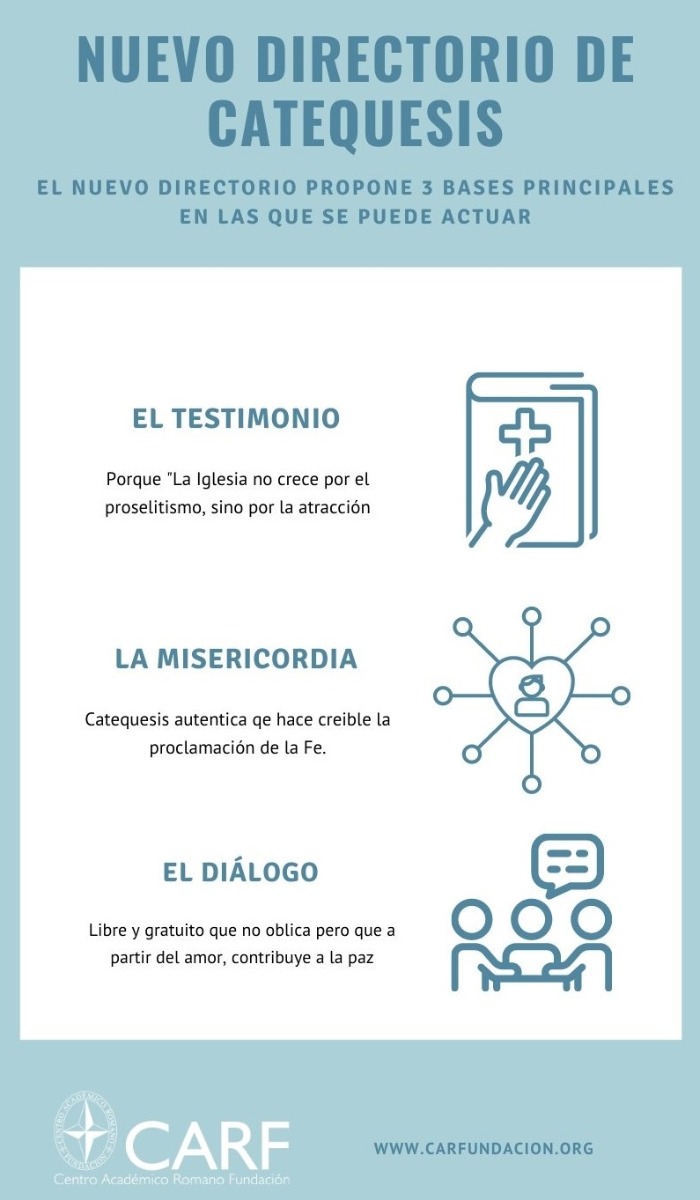
Catechesis promotes personal adhesion to Christ and the maturity of the Christian life. It is distinguished from the religious education The purpose of the school is to transmit knowledge about the Christianity and Christian life in the context of the systematic and critical assimilation of culture.
The meaning of catechesis refers to instruction related to the Catholic religion. The concept is often used with respect to the place or meeting where the doctrine of Christianity is disseminated..
As a result of the catechetical impulse of the Vatican Council IIThe experiences of educators (catechists, missionaries, etc.) from all over the world have been collected and studied on how to develop catechesis in the cultural context of our times.
On March 23, 2009, the Pope Francis approved the publication of the new "Directory for Catechesis"The document was prepared by the Pontifical Council for the New Evangelization, after twelve drafts and six years of work. It is a vast and important document that has reached its third edition after a first edition in 1971, under the pontificate of St. Paul VI, and a second in 1997, approved by the Pontifical Council for the New Evangelization. St. John Paul II.
The new board of directors is headed first and foremost to the bishops and, through them, to those who participate in the faith education in pastoral and academic settings, particularly to the millions of catechists engaged in the transmission of the faith.
As early as 1977, a universal synod on catechesis was held, which resulted in the exhortation Catechesi tradendae (1979), the magna carta magna of education in the faith for our times. The Catechism of the Catholic Church and the Directory have been completing the references that the Magisterium of the Catholic Church has been making to education in the faith for our times. Church offers Catholic educators for their work.
This document provides the theological-pastoral principles of catechesis, leaving the more concrete orientations to the Episcopal Conferences and to the Churches and individuals.
Three main bases are proposed for action in this new Catechetical Directory.
The first is Witness because the Church grows by the natural attraction of its doctrine. The message of Jesus continues to transform the world.
We also count on Mercy. That promotes an authentic catechesis, which believes in the proclamation of the Christian Faith.
And the last resource for a transforming catechesis and action is dialogue, free and gratuitous, listening and respecting opinions. Because if there is love in dialogue, it contributes to peace, respect and understanding.

Directory for Catechesis, 2020, Pope Francis
In the introduction to the new Directory for Catechesis, two phenomena are highlighted that made the revision of this document necessary: the digital culture and the globalization of culture.
In addition to these general contexts, other elements, both positive and negative, along with the challenges of the current situation, should be pointed out, as this Directory does.
For example:
The need to link the truth and the lovethe centrality of the testimony, of the mercy and dialogue; spiritual transformation, promoted by catechesis, as a service to the inculturation of the faith. Attention to the contributions of the human sciences (psychology, pedagogy, sociology, etc.) in order to improve the education in the faith. The relationship between catechesis and popular piety; the change of sensitivity with a rejection of the mentality of moral and religious "obligation" and, therefore, with a more personalist vision of the moral education.
as well as, doctrinal relativism; the need to better explain the freedom The priority of the unity or coherence of Christian life that education should foster. The understanding of catechesis in the framework of the Christian community; the importance of liturgical education or "mystagogy" through the catechumenate.
The elements of the "digital culture" that can help or need help from education in the faith; the "languages" of catechesis, the "way of beauty" and the role of memory; the horizon of service to society and transformation of the world. The learning of the discernment at the educational and catechetical level.
The articulation of the local cultural elements with the scope of the universalcatechesis of the most poorof the migrants, of the imprisoned. The ecumenical dimension The role of catechesis and its role in dialogue with religions, indifference and unbelief; catechesis and the perspective of "gender" and other questions in reference to the culture of life and bioethics; forms and ways of family catechesis; catechesis and ecology, etc.
St. Paul VI was mindful of the profound and rapid changes that were already looming when he wrote his exhortation Evangelii nuntiandi (1975) on evangelization in the contemporary world. Pope Francis has been reinforcing the evangelizing commitment of each believer since his programmatic exhortation Evangelii gaudium (2013) on the proclamation of the Gospel in today's world.
It openly declares the criterion that provoked its reflection and writing: the "first proclamation of the faith" (called kerygma in the New Testament).
This first proclamation is not a discourse articulated to convince the interlocutor, but the witness of a personal encounter with Jesus Christ. From this central point, faith unfolds its "contents," is celebrated in the liturgy, is lived in its own style (Christian morality) and is manifested and nourished through prayer.
Everything starts, then, from a missionary understanding of catechesis. In this sense, a "kerygmatic catechesis" is promoted, capable, in turn, of making of all the faithful "...".missionary disciples".
Along with the cultural context that required it, the criteria for its elaboration, the continuity with the previous magisterium, the synodal path of the Church and recent pontificates. The new directory is rooted in the perspective of holiness as a program of life that Christian educators, and particularly catechists, are called to follow.
The Directory consists of three main parts:
In short, this is a text of reference for all those directly involved in catechesis, such as education in faith and, indirectly, also for all those interested in the education or teaching of questions concerning the Christian faith. Of particular interest are the analyses of the digital culture and orientations on ways to follow in the catechetical process, as part of the broader process of evangelization in search of the fullness of human life.
Mr. Ramiro Pellitero Iglesias
Professor of Pastoral Theology
Faculty of Theology
University of Navarra
Published in "Church and new evangelization".